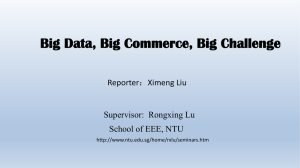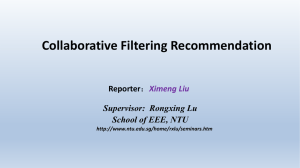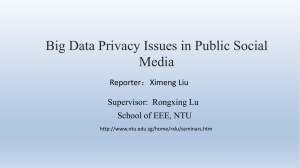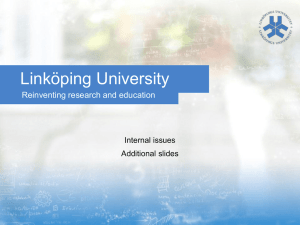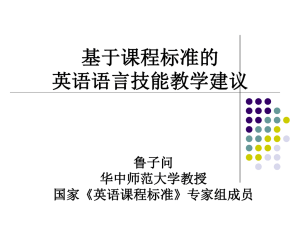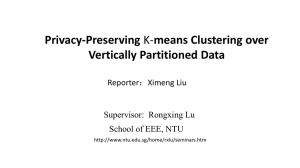20131005ximengliu
advertisement
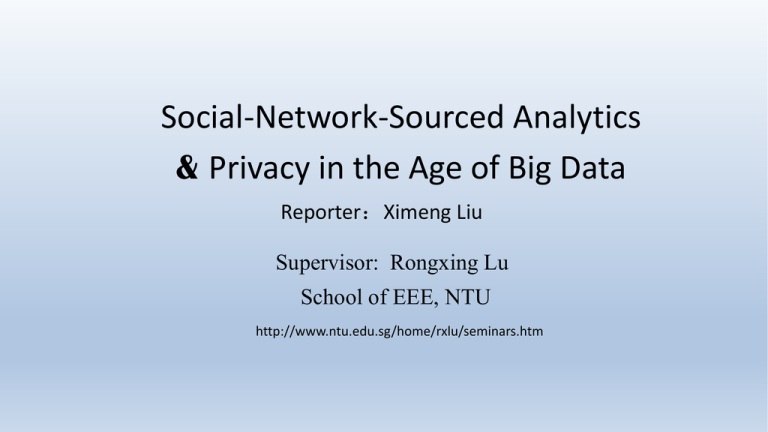
Social-Network-Sourced Analytics & Privacy in the Age of Big Data Reporter:Ximeng Liu Supervisor: Rongxing Lu School of EEE, NTU http://www.ntu.edu.sg/home/rxlu/seminars.htm References SOURCE: Privacy in the age of big data: a time for big decisions. SOURCE: Social-Network-Sourced Big Data Analytics http://www.ntu.edu.sg/home/rxlu/seminars.htm Liu Ximeng nbnix@qq.com Outline BIG DATA: big data The virtuous circle Big benefits. BIG DATA: Privacy concerns. http://www.ntu.edu.sg/home/rxlu/seminars.htm Liu Ximeng nbnix@qq.com Big data Walmart’s transactional databases more than 2.5 petabytes of data consisting of customer behaviors and preferences, network and device activity, and market trends data. Moreover, sensor, social media, mobile, and location data are growing at an unprecedented rate. In parallel to this significant growth, data are also becoming increasingly interconnected. http://www.ntu.edu.sg/home/rxlu/seminars.htm Liu Ximeng nbnix@qq.com Big data Facebook, for instance, is nearly fully connected, with 99.91 percent of individuals on the social network belonging to a single, large connected component. One open challenge is determining how Internet computing technology should evolve to let us access, assemble, analyze, and act on big data. http://www.ntu.edu.sg/home/rxlu/seminars.htm Liu Ximeng nbnix@qq.com Big data, big connect Most social networks connect people or groups who expose similar interests or features. In the near future, we expect that such networks will connect other entities. More importantly, the interactions among people and nonhuman artifacts have significantly enhanced data scientists’ productivity. Big data analytics can accumulate the wisdom of crowds, reveal patterns, and yield best practices. http://www.ntu.edu.sg/home/rxlu/seminars.htm Liu Ximeng nbnix@qq.com Big data: Big benefits The uses of big data can be transformative, and the possible uses of the data can be difficult to anticipate at the time of initial collection. Example in health sector: 27,000 cardiac arrest deaths occurring between 1999 and 2003 to use of Vioxx. This was made possible by the analysis of clinical and cost data collected by Kaiser Permanente. http://www.ntu.edu.sg/home/rxlu/seminars.htm Liu Ximeng nbnix@qq.com Big data: Big benefits Google Flu Trends: a service that predicts and locates outbreaks of the flu by making use of information— aggregate search queries. Of course, early detection of disease, when followed by rapid response, can reduce the impact of both seasonal and pandemic influenza. http://www.ntu.edu.sg/home/rxlu/seminars.htm Liu Ximeng nbnix@qq.com Big data: Big benefits Health sector is by no means the only arena for transformative data use. The smart grid is designed to allow electricity service providers, users, and other third parties to monitor and control electricity use. Benefits: who are able to reduce energy consumption by learning which devices and appliances consume the most energy, or which times of the day put the highest or lowest overall demand on the grid. http://www.ntu.edu.sg/home/rxlu/seminars.htm Liu Ximeng nbnix@qq.com Big data: Big benefits Big data is also transforming the retail market. Wal-Mart’s inventory management system, called Retail Link, pioneered the age of big data by enabling suppliers to see the exact number of their products on every shelf of every store at each precise moment in time. Amazon’s “Customers Who Bought This Also Bought” feature, prompting users to consider buying additional items selected by a collaborative filtering tool. http://www.ntu.edu.sg/home/rxlu/seminars.htm Liu Ximeng nbnix@qq.com The virtuous circle Connected people produce a continuous data stream that’s deposited into a repository of connected data; Individuals or business entities might conduct big data analytics on these connected data by leveraging ad hoc clouds or connected computers; and Analytics on the big data from these connected computers generates intelligence that subsequently proliferates back to connected people. In fact, connected data is the confluence where social networks and clouds are presented as a solution for big data analysis. http://www.ntu.edu.sg/home/rxlu/seminars.htm Liu Ximeng nbnix@qq.com The virtuous circle http://www.ntu.edu.sg/home/rxlu/seminars.htm Liu Ximeng nbnix@qq.com Connected People: Social Networks and Big Data 1. Humanistic Social Networks Social scientists and sociologists have employed several methods to managing the networks. Modeling approaches include network-oriented data collection, block modeling, network-oriented data sampling, diffusion models, and models for longitudinal or emerging data. http://www.ntu.edu.sg/home/rxlu/seminars.htm Liu Ximeng nbnix@qq.com Connected People: Social Networks and Big Data 2. Complex Network Theory Mathematicians and physicists more quantitative aspects. Network structure is irregular, complex, and dynamically evolving in time. http://www.ntu.edu.sg/home/rxlu/seminars.htm Liu Ximeng nbnix@qq.com Connected People: Social Networks and Big Data Most fundamental forms as graphs or small-world networks, but more intricate topographies are represented as weighted, random, power-law, or spatial networks. Spectral graph partitioning determines the minimal number of edges between two sets of vertexes within a graph. http://www.ntu.edu.sg/home/rxlu/seminars.htm Liu Ximeng nbnix@qq.com Connected People: Social Networks and Big Data Hierarchical clustering a priori knowledge of the number of communities is lacking. Divide nodes into clusters the connections within the cluster more closely related than the connections to nodes assigned to a different cluster. http://www.ntu.edu.sg/home/rxlu/seminars.htm Liu Ximeng nbnix@qq.com Connected People: Social Networks and Big Data 3. Information Networks and Social Networking Combined social and complex networks networks representing information-systems oriented environments. Fundamental question: “Do online social networks resemble or behave in similar ways as people in real-world situations?” http://www.ntu.edu.sg/home/rxlu/seminars.htm Liu Ximeng nbnix@qq.com Connected People: Social Networks and Big Data 4. Social Networks as Big Data Hope to predict behavior to ultimately enhance marketing, sales, and online commerce. Characterized by the “three Vs” http://www.ntu.edu.sg/home/rxlu/seminars.htm Liu Ximeng nbnix@qq.com Connected Computers: Advances in Scale-Out Systems Adopting scale-out rather than scale-up systems. http://www.ntu.edu.sg/home/rxlu/seminars.htm Liu Ximeng nbnix@qq.com Connected Computers: Advances in Scale-Out Systems Key features of the scale-out pattern server clusters, share-nothing architecture (no shared memory, storage, and so on), a TCP/ IP network connection, and a parallel programming framework such as MapReduce. Dropbox, Amazon’s Simple Storage Service (S3). Amazon Elastic MapReduce to power its user-behavior analytics. Microsoft Windows Azure and IBM SmartCloud Enterprise+ . On top of the Apache Hadoop ecosystem. http://www.ntu.edu.sg/home/rxlu/seminars.htm Liu Ximeng nbnix@qq.com Connected Computers: Advances in Scale-Out Systems Scale-out data stores NoSQL systems flexible schema and elasticity to overcome relational databases’ limitations. http://www.ntu.edu.sg/home/rxlu/seminars.htm Liu Ximeng nbnix@qq.com Connected Computers: Advances in Scale-Out Systems Relational models and SQL provide an abstraction layer between the database’s physical. NoSQL data stores offer various forms of data structures. Users must understand data’s physical organization and employ vendor-specific APIs to manipulate these data. Current state of the art attempts to devise a SQL layer on top of NoSQL, but without an abstract data model. http://www.ntu.edu.sg/home/rxlu/seminars.htm Liu Ximeng nbnix@qq.com Connected Computers: Advances in Scale-Out Systems Incremental Processing and Approximate Result. A large volume of data is injected into such a system at a high speed, while analysis and interpretation must occur at the same pace. Stream computing opens a gateway to real-time analytics. 1. Interplay between building the batch mode model and sensing the realtime streams. (the accumulated historical data an help information specialists build a statistical model to guide stream processing, the newly arrived data from the stream system should be leveraged to tune the model to reflect the recent trends.) http://www.ntu.edu.sg/home/rxlu/seminars.htm Liu Ximeng nbnix@qq.com Connected Computers: Advances in Scale-Out Systems Volume-velocity challenges, another perspective is to provide approximate, just-in-time results to queries, or prioritize different queries by allocating a varying amount of resources. http://www.ntu.edu.sg/home/rxlu/seminars.htm Liu Ximeng nbnix@qq.com Connected Computers: Advances in Scale-Out Systems NoSQL, Scalable SQL, and NewSQL NewSQL projects seek to modernize the RDBMS architecture to provide the same scalable performance of NoSQL while preserving the ACID guarantees of a traditional, single-node database system. http://www.ntu.edu.sg/home/rxlu/seminars.htm Liu Ximeng nbnix@qq.com Connected Data: New Challenges for Clouds and Social Networks Users on these sites aren’t usually trying to connect with strangers but are primarily communicating with people who are already part of their direct or extended social network. A level of trust already exists between social network users Establishing security policies that leverage existing trust relationships, promoting data and resource sharing within networks of people with similar interests, and optimizing data analytics by leveraging the fact that people in the same network potentially share the same interests and will thus submit similar queries. http://www.ntu.edu.sg/home/rxlu/seminars.htm Liu Ximeng nbnix@qq.com Connected Data: New Challenges for Clouds and Social Networks 1. Resource Sharing Social networking on the cloud could enable resource sharing based on the social relationship between users. volunteer computing. Questions: reliability and quality-ofservice (QoS) guarantees build reputation for users and establish their corresponding resource reliability http://www.ntu.edu.sg/home/rxlu/seminars.htm Liu Ximeng nbnix@qq.com Connected Data: New Challenges for Clouds and Social Networks 2. Locality of Reference in the Cloud In computer science, locality of reference, also known as the principle of locality, is a phenomenon describing the same value, or related storagelocations, being frequently accessed. There are two basic types of reference locality. Temporal locality and Spatial locality.1 These users are potentially interested in the same patterns, so computations would exhibit high locality of reference, which can help to optimize performance. 1 Source: Locality of reference, http://en.wikipedia.org/wiki/Locality_of_reference http://www.ntu.edu.sg/home/rxlu/seminars.htm Liu Ximeng nbnix@qq.com Connected Data: New Challenges for Clouds and Social Networks 3. Privacy-Preserving Data Analytics Privacy-preserving statistical techniques, such as differential privacy, can be employed in conjunction with social links to maximize query result accuracy without revealing private data. Differential privacy techniques must also be refined to deal with incremental data that has social annotations. http://www.ntu.edu.sg/home/rxlu/seminars.htm Liu Ximeng nbnix@qq.com Connected Data: New Challenges for Clouds and Social Networks 4. Cross-Domain Data Analytics To perform cross-domain data analytics, we must develop and maintain a common ontology that will capture the differences and similarities in terminologies and define relationships between terms within and across the network. http://www.ntu.edu.sg/home/rxlu/seminars.htm Liu Ximeng nbnix@qq.com Connected Data: New Challenges for Clouds and Social Networks 5. Socializing Access Control Policies Security is a major concern that we must address when coupling social networks with the cloud. We could leverage social relationships to build an evolving access control system that self-adapts to the addition, deletion, and update in users and their relationships Self-adapting policy rules are needed to determine users’ access rights. http://www.ntu.edu.sg/home/rxlu/seminars.htm Liu Ximeng nbnix@qq.com Connected Data: New Challenges for Clouds and Social Networks 6. Service Reputation Frameworks Automatic service discovery and composition can occur based on services’ reputation. A service reputation can be built from users’ feedback and by auditing a service invocation and execution. Some generic frameworks propose incorporating service reputation as a selection criterion when composing services. http://www.ntu.edu.sg/home/rxlu/seminars.htm Liu Ximeng nbnix@qq.com Classification for Social Networks Classify all social networks using two criteria: level of generality and ability to execute. http://www.ntu.edu.sg/home/rxlu/seminars.htm Liu Ximeng nbnix@qq.com Classification for Social Networks http://www.ntu.edu.sg/home/rxlu/seminars.htm Liu Ximeng nbnix@qq.com Classification for Social Networks 1. Informative vs. Executable General-purpose social networking sites have aspects of both: Informative. General-purpose social networks such as Facebook and LinkedIn have been harnessed to cultivate communication and collaboration. Executable. Besides these informative social networks, many websites provide open and collaborative platforms to search for executable mashups, Web services, and so on. Example:Amazon Elastic Compute Cloud http://www.ntu.edu.sg/home/rxlu/seminars.htm Liu Ximeng nbnix@qq.com Classification for Social Networks Research-oriented social networks tend to be naturally integrated with informativeness and execution capabilities: Informative websites are based on author-publication-citation networks and can be used to identify connections among authors, publications, and research topics., such as CiteULike and Nature Network. http://www.ntu.edu.sg/home/rxlu/seminars.htm Liu Ximeng nbnix@qq.com Classification for Social Networks Informative-executable. Many sites go beyond just bringing people together. Rather, they enable researchers to share data and protocols that describe methodologies for conducting experiments and obtaining data. OpenWetWare. Executable. Some research-specific social networks are computation oriented. myExperiment http://www.ntu.edu.sg/home/rxlu/seminars.htm Liu Ximeng nbnix@qq.com Frequency of words Word cloud generated from more than 60 recent research papers on cloud computing and big data in the last two years. http://www.ntu.edu.sg/home/rxlu/seminars.htm Liu Ximeng nbnix@qq.com Big data: big concerns The harvesting of large data sets and the use of analytics clearly implicate privacy concerns. Traditionally, organizations used various methods of de-identification (anonymization, pseudonymization,encryption, key-coding, data sharding) to distance data from real identities and allow analysis to proceed while at the same time containing privacy concerns. http://www.ntu.edu.sg/home/rxlu/seminars.htm Liu Ximeng nbnix@qq.com Big data: big concerns De-identification has become a key component of numerous business models, most notably in the contexts of health data (regarding clinical trials, for example), online behavioral advertising, and cloud computing. http://www.ntu.edu.sg/home/rxlu/seminars.htm Liu Ximeng nbnix@qq.com OPT-IN OR OPT-OUT? Privacy and data protection laws are premised on individual control over information and on principles such as data minimization and purpose limitation. Yet it is not clear that minimizing information collection is always a practical approach to privacy in the age of big data http://www.ntu.edu.sg/home/rxlu/seminars.htm Liu Ximeng nbnix@qq.com OPT-IN OR OPT-OUT? The legitimacy of processing should be assumed even if individuals decline to consent. Example: Web analytics rich value by ensuring that products and services can be improved to better serve consumers. Privacy risks are minimal, if properly implemented, deals with statistical data, typically in deidentified form. Yet requiring online users to opt into analytics would no doubt severely curtail its application and use. http://www.ntu.edu.sg/home/rxlu/seminars.htm Liu Ximeng nbnix@qq.com OPT-IN OR OPT-OUT? Policymakers must also address the role of consent in the privacy framework. Too many processing activities are premised on individual consent. ‘Privacy Policy,’ consumers believe that their personal information will be protected in specific ways; In fact, Privacy policies often serve more as liability disclaimers for businesses than as assurances of privacy for consumers. http://www.ntu.edu.sg/home/rxlu/seminars.htm Liu Ximeng nbnix@qq.com OPT-IN OR OPT-OUT? Collective action problems may generate a suboptimal equilibrium where individuals fail to opt into societally beneficial data processing in the hope of free riding on the goodwill of their peers. This phenomenon is evident in other contexts where the difference between opt-in and opt-out regimes is unambiguous. Also, A consent-based regulatory model tends to be regressive, since individuals’ expectations are based on existing perceptions. Facebook News Feed feature in 2006 http://www.ntu.edu.sg/home/rxlu/seminars.htm Liu Ximeng nbnix@qq.com Opportunities for engineers and scientists Engineers will need to introduce new distributed data analysis frameworks in which users have access to subsets of the “big data” datasets as well as situational awareness into global processing. New simulation techniques for predictive decision support when deciding when or if to initiate a new analysis. New comprehensive cross-network, crosscloud data models must be developed http://www.ntu.edu.sg/home/rxlu/seminars.htm Liu Ximeng nbnix@qq.com Opportunities for engineers and scientists In a socially connected world, however, these policies must leverage interconnected, graph-based social relationships. A need will exist for highly self-configurable security policies to protect users’ security and privacy while also preserving privacy embedded within the data. http://www.ntu.edu.sg/home/rxlu/seminars.htm Liu Ximeng nbnix@qq.com Disscussion on big data privacy & security 1. De-identification. 2. highly self-configurable security policies to protect users’ security and privacy while also preserving privacy embedded within the data. http://www.ntu.edu.sg/home/rxlu/seminars.htm Liu Ximeng nbnix@qq.com Thank you Rongxing’s Homepage: http://www.ntu.edu.sg/home/rxlu/index.htm PPT available @: http://www.ntu.edu.sg/home/rxlu/seminars.htm Ximeng’s Homepage: http://www.liuximeng.cn/ http://www.ntu.edu.sg/home/rxlu/seminars.htm Liu Ximeng nbnix@qq.com
